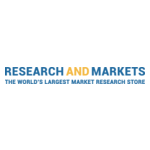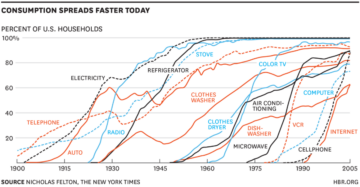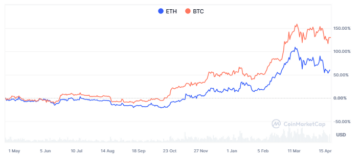DUBLIN–(BUSINESS WIRE)–The “Enterprise IoT Market – Global Industry Size, Share, Trends, Opportunity, and Forecast, 2018-2028F” report has been added to ResearchAndMarkets.com’s offering.
Global Enterprise IoT Market was valued at USD 214 Billion in 2022 and is anticipated to project robust growth in the forecast period with a CAGR of 17.3% through 2028.
The Global Enterprise IoT Market is experiencing robust growth as businesses worldwide embrace the transformative potential of Internet of Things (IoT) technologies. Enterprises are integrating IoT solutions into their operations to optimize processes, enhance productivity, and gain competitive advantages. IoT devices and sensors enable real-time data collection, fostering data-driven decision-making and predictive analytics.
Industries such as manufacturing, healthcare, logistics, and agriculture are leveraging IoT to streamline supply chains, monitor equipment health, improve customer experiences, and reduce operational costs. The proliferation of connected devices, coupled with advancements in cloud computing and data analytics, has paved the way for innovative IoT applications.
North America dominated the Global Enterprise IoT Market and is expected to maintain its dominance during the forecast period. North America has been at the forefront of technological advancements and digital transformation, making it a key market for IoT solutions. The region has a highly developed IT infrastructure, a large number of tech-savvy consumers, and a strong presence of major technology companies.
Additionally, the region has witnessed significant investments in IoT technologies by various industries, including manufacturing, healthcare, transportation, and agriculture. The increasing adoption of IoT in these sectors is driving the growth of the market in North America. Moreover, the presence of major players such as IBM Corporation, Microsoft Corporation, and Cisco Systems Inc. in the region is further fueling the market growth.
Furthermore, the rise of 5G networks has bolstered IoT capabilities, enabling faster and more reliable connectivity for a multitude of devices. As businesses continue to recognize the strategic value of IoT in driving efficiency and innovation, the Global Enterprise IoT Market is poised for sustained expansion. Companies investing in IoT solutions are well-positioned to adapt to evolving market demands, improve customer satisfaction, and achieve operational excellence, thereby fueling the market’s growth trajectory.
Key Market Drivers
Integration Across Diverse Industries
- Global Enterprise IoT Market grows due to integration across diverse industries.
- IoT used in manufacturing for predictive maintenance and real-time monitoring.
- Healthcare utilizes IoT for remote patient monitoring and inventory management.
- Logistics and agriculture sectors benefit from IoT-enabled tracking systems.
- Smart cities apply IoT for traffic management and waste management.
- IoT transforms operational processes and enhances efficiency across industries.
Advanced Technological Capabilities
- Global Enterprise IoT Market thrives due to advanced technology.
- IoT solutions feature real-time data analytics, machine learning, and AI.
- IoT platforms integrate with various sensors and devices for data collection.
- Machine learning predicts patterns and trends, reducing operational costs.
- AI-driven IoT applications personalize services and automate tasks.
- Edge computing in IoT enhances processing capabilities and reduces latency.
Focus on Security and Privacy
- The market expands due to a focus on security and privacy.
- IoT deploys end-to-end encryption, secure authentication, and blockchain.
- GDPR compliance encourages investment in secure IoT solutions.
- Secure boot mechanisms and OTA updates protect against cyber threats.
- Privacy concerns addressed through user consent management and anonymization.
- Assurance of secure and private IoT deployments fuels market growth.
IoT Ecosystem Expansion
- The market witnesses expansion through IoT device proliferation.
- Affordable sensors and low-power connectivity options accelerate IoT adoption.
- IoT platforms and marketplaces facilitate diverse application integration.
- Partnerships among stakeholders drive innovation and expand IoT applications.
- The IoT ecosystem evolves, offering diverse devices, applications, and services.
- Sustained growth expected as IoT caters to unique industry needs.
Key Market Challenges Compatibility and Fragmentation
- The market faces challenges related to compatibility and fragmentation.
- Diverse communication protocols and standards hinder seamless integration.
- Lack of compatibility leads to complex situations and resource-intensive solutions.
- Fragmentation complicates the landscape, hindering IoT adoption.
- Standardization of communication protocols is essential for compatibility.
- Collaborative efforts needed to harmonize standards for streamlined experiences.
Counterfeit and Low-Quality Products
- Counterfeit and low-quality IoT products pose risks to users and systems.
- Inferior solutions lack security features and are vulnerable to cyber threats.
- Quality control measures and awareness campaigns are necessary.
- Robust cybersecurity technologies, encryption, and authentication needed.
- Ensuring data confidentiality and integrity is crucial.
- Awareness campaigns help organizations identify genuine IoT products.
Environmental Impact
- IoT adoption contributes to environmental concerns, especially electronic waste.
- Responsible disposal programs needed for outdated IoT devices.
- Energy-efficient components and eco-friendly manufacturing practices reduce impact.
- Collaboration between manufacturers, regulatory bodies, and businesses is vital.
- Recycling and sustainable practices promote a greener IoT future.
- Minimizing electronic waste and promoting eco-friendliness are priorities.
Standardization of Communication Protocols
- The absence of standardized communication protocols poses challenges.
- Different industries implement proprietary IoT technologies.
- Lack of standardization hinders interoperability and collaboration.
- Industries like healthcare, manufacturing, and smart cities face inefficiencies.
- Collaboration among stakeholders, regulatory bodies, and experts needed.
- Standardized protocols simplify integration and enhance interoperability.
Key Market Trends Integration of Advanced Communication Features
- The market experiences transformation through advanced communication features.
- Voice communication systems incorporate real-time translation and sentiment analysis.
- Multilingual communication, enhanced user experience, and valuable insights result.
- Artificial intelligence and machine learning refine voice communication.
- Intelligent routing, automated responses, and predictive analytics improve efficiency.
- Market commits to providing cutting-edge communication solutions.
Rise of Cloud-Based Voice Communication Solutions
- Cloud-based voice communication solutions dominate the market.
- Cloud technology offers flexibility, scalability, and cost-efficiency.
- Seamless integration with cloud services enables unified communication.
- Virtual phone numbers, call recording, and IVR without complex hardware.
- Cloud-based solutions are crucial for remote work and virtual collaboration.
- SMEs benefit from affordable and robust cloud-based communication.
Focus on Security and Data Privacy
- Security and data privacy are paramount in the market.
- Encryption, multi-factor authentication, and SSL safeguard voice calls.
- Compliance with data protection regulations drives secure communication.
- Secure voice communication applications cater to specific industries.
- Ensuring data confidentiality remains essential.
- Voice communication remains secure, private, and trusted.
Enhanced User Experience through Voice User Interfaces (VUI)
- VUI revolutionizes user interactions with voice communication systems.
- AI and natural language processing enable intuitive voice commands.
- Virtual assistants and chatbots offer instant responses and personalization.
- Automation of routine inquiries reshapes customer service and support.
- Smart speakers and voice-enabled devices boost VUI significance.
- VUI technology advances for user-friendliness and accessibility.
Growing Embrace of Unified Communication Platforms
- Unified Communication Platforms gain adoption, centralizing communication channels.
- Team collaboration and communication workflows are simplified.
- Integration with business applications enhances productivity.
- Hybrid work models drive the demand for unified communication solutions.
- Real-time collaboration, file sharing, and project management are facilitated.
- Sector-specific unified communication solutions cater to various industries.
Competitive Landscape
- Microsoft Corporation
- IBM Corporation
- Cisco Systems, Inc.
- Intel Corporation
- Siemens AG
- Huawei Technologies Co., Ltd.
- SAP SE
- Oracle Corporation
- Amazon Web Services, Inc.
- Google LLC
For more information about this report visit https://www.researchandmarkets.com/r/1k7b87
About ResearchAndMarkets.com
ResearchAndMarkets.com is the world’s leading source for international market research reports and market data. We provide you with the latest data on international and regional markets, key industries, the top companies, new products and the latest trends.
Contacts
ResearchAndMarkets.com
Laura Wood, Senior Press Manager
For E.S.T Office Hours Call 1-917-300-0470
For U.S./ CAN Toll Free Call 1-800-526-8630
For GMT Office Hours Call +353-1-416-8900
- SEO Powered Content & PR Distribution. Get Amplified Today.
- PlatoData.Network Vertical Generative Ai. Empower Yourself. Access Here.
- PlatoAiStream. Web3 Intelligence. Knowledge Amplified. Access Here.
- PlatoESG. Carbon, CleanTech, Energy, Environment, Solar, Waste Management. Access Here.
- PlatoHealth. Biotech and Clinical Trials Intelligence. Access Here.
- Source: https://www.fintechnews.org/global-enterprise-iot-industry-report-2023-a-214-billion-market-in-2022-size-share-trends-opportunities-and-forecasts-2018-2028f-researchandmarkets-com/
- :has
- :is
- 17
- 2022
- 2023
- 2028
- 214
- 5G
- 5G networks
- a
- About
- accelerate
- accessibility
- Achieve
- across
- adapt
- added
- Additionally
- addressed
- Adoption
- advanced
- Advanced Technology
- advancements
- advances
- advantages
- affordable
- against
- agriculture
- AI
- Amazon
- Amazon Web Services
- america
- among
- analysis
- analytics
- and
- Anticipated
- Application
- applications
- Apply
- ARE
- artificial
- artificial intelligence
- Artificial Intelligence and Machine Learning
- AS
- assistants
- assurance
- At
- Authentication
- automate
- Automated
- Automation
- awareness
- been
- benefit
- between
- Billion
- blockchain
- bodies
- bolstered
- boost
- business
- Business Applications
- Business Wire
- businesses
- by
- CAGR
- call
- Calls
- Campaigns
- CAN
- capabilities
- cater
- caters
- chains
- challenges
- channels
- chatbots
- Cisco
- cisco systems
- Cities
- Cloud
- cloud computing
- cloud services
- CLOUD TECHNOLOGY
- CO
- collaboration
- collaborative
- collection
- COM
- Communication
- communication systems
- Companies
- compatibility
- competitive
- complex
- compliance
- components
- computing
- Concerns
- confidentiality
- connected
- connected devices
- Connectivity
- consent
- Consent Management
- Consumers
- continue
- contributes
- control
- CORPORATION
- Costs
- Counterfeit
- coupled
- crucial
- customer
- Customer satisfaction
- Customer Service
- cutting-edge
- cyber
- Cybersecurity
- data
- Data Analytics
- data privacy
- data protection
- data-driven
- Decision Making
- Demand
- demands
- deployments
- deploys
- developed
- device
- Devices
- different
- digital
- Digital Transformation
- disposal
- diverse
- Dominance
- dominate
- dominated
- drive
- drives
- driving
- due
- during
- e
- Eco-friendly
- ecosystem
- Edge
- edge computing
- efficiency
- efforts
- Electronic
- embrace
- enable
- enables
- enabling
- encourages
- encryption
- end-to-end
- end-to-end encryption
- enhance
- enhanced
- Enhances
- ensuring
- Enterprise
- enterprises
- environmental
- environmental concerns
- equipment
- especially
- essential
- evolves
- evolving
- Excellence
- Expand
- expands
- expansion
- expected
- experience
- Experiences
- experiencing
- experts
- Face
- faces
- facilitate
- facilitated
- faster
- Feature
- Features
- File
- Flexibility
- Focus
- For
- Forecast
- forecasts
- forefront
- fostering
- fragmentation
- Free
- from
- fueling
- fuels
- further
- Furthermore
- future
- Gain
- GDPR
- GDPR compliance
- genuine
- Global
- GMT
- greener
- Grows
- Growth
- Hardware
- harmonize
- Health
- healthcare
- help
- highly
- hinder
- hinders
- HOURS
- HTTPS
- Huawei
- Hybrid
- Hybrid Work
- IBM
- identify
- Impact
- implement
- improve
- in
- Inc.
- Including
- incorporate
- increasing
- industries
- industry
- inefficiencies
- information
- Infrastructure
- Innovation
- innovative
- Inquiries
- insights
- instant
- integrate
- Integrating
- integration
- integrity
- Intel
- Intelligence
- Intelligent
- interactions
- interfaces
- International
- Internet
- internet of things
- Interoperability
- into
- intuitive
- inventory
- Inventory Management
- investing
- investment
- Investments
- iot
- IoT Device
- iot devices
- IT
- ITS
- jpg
- Key
- Lack
- landscape
- language
- large
- Latency
- latest
- leading
- Leads
- learning
- leveraging
- like
- logistics
- Ltd
- machine
- machine learning
- maintain
- maintenance
- major
- Making
- management
- Manufacturers
- manufacturing
- Market
- Market Data
- market research
- marketplaces
- Markets
- measures
- mechanisms
- Microsoft
- minimizing
- models
- Monitor
- monitoring
- more
- Moreover
- multi-factor authentication
- multitude
- Natural
- Natural Language
- Natural Language Processing
- necessary
- needed
- needs
- networks
- New
- new products
- North
- north america
- number
- numbers
- of
- offer
- offering
- Offers
- Office
- on
- operational
- Operational processes
- Operations
- opportunities
- Opportunity
- Optimize
- Options
- oracle
- organizations
- Paramount
- partnerships
- patient
- patient monitoring
- patterns
- paved
- period
- personalization
- personalize
- phone
- Platforms
- plato
- Plato Data Intelligence
- PlatoData
- players
- poised
- pose
- poses
- potential
- practices
- predictive
- Predictive Analytics
- Predicts
- presence
- press
- privacy
- private
- processes
- processing
- productivity
- Products
- Programs
- project
- project management
- proliferation
- promote
- promoting
- proprietary
- protect
- protection
- protocols
- provide
- providing
- quality
- real-time
- real-time data
- recognize
- recording
- recycling
- reduce
- reduces
- reducing
- refine
- region
- regional
- regulations
- regulatory
- related
- reliable
- remains
- remote
- remote work
- report
- Report 2023
- Reports
- research
- ResearchAndMarkets.com
- resource-intensive
- responses
- responsible
- result
- revolutionizes
- Rise
- risks
- robust
- routine
- routing
- s
- sap
- satisfaction
- Scalability
- seamless
- sector-specific
- Sectors
- secure
- security
- senior
- sensors
- sentiment
- service
- Services
- Share
- sharing
- Siemens
- significance
- significant
- simplified
- simplify
- situations
- Size
- smart
- Smart Cities
- Smart Speakers
- SMEs
- Solutions
- Source
- speakers
- specific
- SSL
- stakeholders
- standardization
- standardized
- standards
- Strategic
- streamline
- streamlined
- strong
- such
- supply
- Supply chains
- support
- sustainable
- sustained
- Systems
- T
- tasks
- team
- technological
- Technologies
- Technology
- technology companies
- The
- The Landscape
- their
- thereby
- These
- things
- this
- threats
- thrives
- Through
- to
- top
- Tracking
- traffic
- trajectory
- Transformation
- transformative
- transforms
- Translation
- transportation
- Trends
- trusted
- unified
- unique
- Updates
- USD
- used
- User
- User Experience
- users
- utilizes
- Valuable
- value
- valued
- various
- Virtual
- Visit
- vital
- Voice
- voice commands
- Vulnerable
- was
- Waste
- Way..
- we
- web
- web services
- Wire
- with
- without
- witnessed
- wood
- Work
- workflows
- world’s
- worldwide
- you
- zephyrnet












